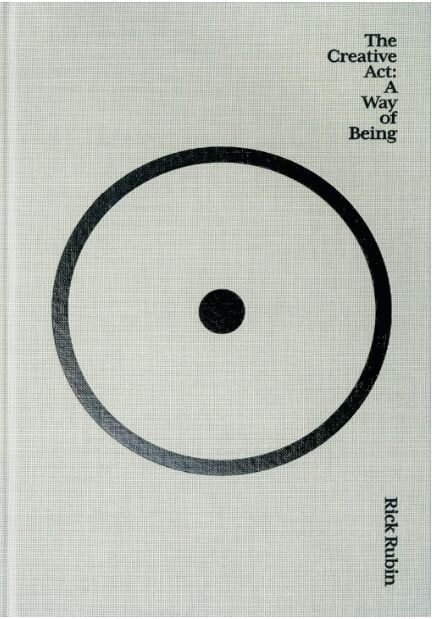“The Creative Act” by Rick Rubin with Neil Strauss
Here is one other cool book suggestion, this one is all about creativity. Please, don’t forget to rate us so we know how we’re doing after reading the summary. Let’s dive in…
What’s the Book About?
“The Creative Act: A Way of Being” is Rick Rubin’s deep dive into the philosophy of creativity. Rubin, a legendary music producer, teams up with Neil Strauss to explore what it means to be creative and how one can cultivate creativity in daily life. This isn’t just a guide for artists; it’s a manifesto for anyone looking to enhance their creative potential.
Key Themes & Takeaways
1. Everyone is a Creator
- Core Idea: Creativity isn’t confined to traditional art forms like painting or music. According to Rubin, anyone who brings something new into existence is an artist. This could be a new business idea, a recipe, or even a solution to a problem.
- Philosophical Grounding: Rubin emphasizes that creativity is a fundamental aspect of being human. It’s about tapping into your inner resources and expressing them outwardly. He states that self-expression is not just a choice but a way of being.
2. Phases of Creation
Rubin outlines four distinct phases in the creative process:
- Seed Phase:
- Description: This is the inception stage where ideas are born. Collect as many ideas as possible without judgment.
- Advice: Treat each idea as a seed. Some may grow into full-fledged projects, while others may not. The key is to gather them without forming conclusions too early.
- Experimentation Phase:
- Description: Here, you play with the collected ideas. This phase is about exploration and asking “what if” questions.
- Advice: Avoid deciding on a specific direction too quickly. This phase is about generating possibilities rather than eliminating them.
- Craft Phase:
- Description: This is where the hard work begins. It involves refining and honing your ideas.
- Advice: Be wary of spending too long in this phase. Rubin warns against “demo-itis,” where you get too attached to early drafts. Keep moving forward and avoid over-polishing.
- Completion Phase:
- Description: The final phase where you polish your work and prepare to release it into the world.
- Advice: Fight the urge to seek perfection. Recognize that finishing one project allows you to start another. Remember, you are the primary audience for your work.
3. The Role of Inspiration
- Core Idea: Inspiration can come from anywhere, and it’s often fleeting. Rubin emphasizes the importance of being open to inspiration and acting on it when it strikes.
- Practical Tips: Rubin suggests varying your inputs to stay inspired. This can mean changing your environment, experimenting with different mediums, or simply observing the world around you more attentively.
4. Dealing with Doubt
- Self-Doubt: This type of doubt can paralyze you, making you question your capability to create.
- Doubt About Your Work: While this can be harmful, it can also drive you to improve. Recognize which type of doubt you’re experiencing and address it accordingly.
5. Collaboration and Risk-Taking
- Collaboration: Rubin discusses the importance of collaboration in the creative process. Working with others can bring new perspectives and ideas.
- Risk-Taking: Creativity often requires stepping out of your comfort zone. Rubin highlights the necessity of taking risks to generate fresh ideas and push creative boundaries.
6. Creativity as a Way of Life
- Core Idea: Creativity isn’t just an act but a way of living. It’s about being aware, curious, and open to the world around you.
- Daily Practice: Rubin integrates the idea that cultivating creativity involves daily practices and habits. It’s about training yourself to see the world differently and being open to the flow of ideas.
Practical Tips for Cultivating Creativity
- Change Your Environment: If you’re feeling stuck, changing your surroundings can help. This could mean rearranging your workspace, traveling, or even just going for a walk.
- Small Steps: Break down your work into smaller tasks. For example, if you’re writing a book, focus on writing one sentence a day to maintain momentum.
- Vary Your Inputs: Listen to different types of music, watch movies without sound, or read books outside your usual genre to spark new ideas.
- Experiment Freely: Don’t be afraid to try new things and fail. Experimentation is a crucial part of finding what works best for you.
Final Thoughts
“The Creative Act: A Way of Being” is a profound exploration of what it means to live a creative life. Rubin’s wisdom, drawn from his extensive experience in the music industry, offers valuable insights for anyone looking to tap into their creative potential. Whether you’re an artist, entrepreneur, or just someone looking to add more creativity to your life, this book provides practical advice and philosophical grounding to help you along your journey.
Who is Rick Rubin?
Imagine a guy who looks like he could be a wizard, with a long beard and a serene, almost mystical presence. That’s Rick Rubin for you. He’s like the Gandalf of the music world, known for his uncanny ability to bring out the best in artists across a wide range of genres. Rick Rubin is a legendary music producer, but he’s not your typical industry mogul. He’s more like a zen master who uses his calm and intuitive approach to create magic in the recording studio.
His Journey
- Early Days: Rick started out as a punk rocker. He co-founded Def Jam Recordings in his NYU dorm room back in 1984, alongside Russell Simmons. Together, they helped bring hip-hop into the mainstream with artists like LL Cool J, the Beastie Boys, and Run-D.M.C. Rubin’s early work with these artists helped define the sound of the 80s hip-hop scene.
- Genre-Spanning Producer: Rubin isn’t confined to one genre. He’s worked with everyone from heavy metal bands like Metallica and Slayer to country legend Johnny Cash. His production on Cash’s “American Recordings” series is particularly noteworthy, stripping down the music to its raw essentials and revitalizing Cash’s career.
- Chill Vibes in the Studio: Rick’s production style is famously laid-back. He often sits barefoot on a couch during recording sessions, creating an atmosphere that encourages artists to relax and be themselves. This vibe has helped artists tap into deeper, more authentic performances. He believes in minimalism and often strips down songs to their core elements, letting the true essence shine through.
Philosophy on Creativity
Rubin’s approach to creativity is all about staying open and receptive. He sees creativity as a fundamental part of being human and believes that everyone has the potential to create. His book, “The Creative Act: A Way of Being,” explores these ideas further, offering insights into how anyone can cultivate creativity in their lives.
Fun Facts
- Meditation Enthusiast: Rick Rubin is big into meditation. He credits his practice with helping him stay grounded and maintain his unique approach to producing music. His zen-like demeanor is a big part of what makes him such a calming presence in the studio.
- Barefoot and Bearded: He’s often seen barefoot and has a signature long beard, adding to his guru-like image. It’s all part of his relaxed, unconventional style that sets him apart from the typical music industry executive.
Why You’ll Love Him
If you appreciate someone who brings a sense of calm and profound insight into their work, you’ll love Rick Rubin. He’s not just about making hits; he’s about making meaningful art. His ability to bridge different genres and bring out the best in artists has made him a revered figure in the music world. Whether you’re into rock, hip-hop, country, or anything in between, Rubin’s work has likely touched a piece of music you love.
So, that’s Rick Rubin for you: the barefoot, bearded wizard of music production, whose zen-like approach has helped shape the soundtracks of our lives.







